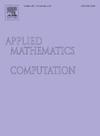Energy-conserving Kansa methods for Hamiltonian wave equations
IF 3.4
2区 数学
Q1 MATHEMATICS, APPLIED
引用次数: 0
Abstract
We introduce a fast, constrained meshfree solver designed specifically to inherit energy conservation (EC) in second-order time-dependent Hamiltonian wave equations. For discretization, we adopt the Kansa method, also known as the kernel-based collocation method, combined with time-stepping. This approach ensures that the critical structural feature of energy conservation is maintained over time by embedding a quadratic constraint into the definition of the numerical solution. To address the computational challenges posed by the nonlinearity in the Hamiltonian wave equations and the EC constraint, we propose a fast iterative solver based on the Newton method with successive linearization. This novel solver significantly accelerates the computation, making the method highly effective for practical applications. Numerical comparisons with the traditional secant methods highlight the competitive performance of our scheme. These results demonstrate that our method not only conserves the energy but also offers a promising new direction for solving Hamiltonian wave equations more efficiently. While we focus on the Kansa method and corresponding convergence theories in this study, the proposed solver is based solely on linear algebra techniques and has the potential to be applied to EC constrained optimization problems arising from other PDE discretization methods.
哈密顿波动方程的节能Kansa方法
我们介绍了一种快速的、有约束的无网格求解器,专门用于继承二阶时变哈密顿波动方程的能量守恒(EC)。对于离散化,我们采用Kansa方法,也称为基于核的配置方法,结合时间步进。这种方法通过将二次约束嵌入到数值解的定义中,确保了随着时间的推移保持能量守恒的关键结构特征。为了解决哈密顿波动方程的非线性和EC约束所带来的计算挑战,我们提出了一种基于连续线性化牛顿法的快速迭代求解器。该求解器大大加快了计算速度,使该方法具有很高的实际应用价值。与传统割线方法的数值比较突出了该方案的竞争性能。这些结果表明,我们的方法不仅节省了能量,而且为更有效地求解哈密顿波动方程提供了一个有希望的新方向。虽然我们在本研究中关注的是Kansa方法和相应的收敛理论,但所提出的求解器仅基于线性代数技术,并且具有应用于其他PDE离散化方法引起的EC约束优化问题的潜力。
本文章由计算机程序翻译,如有差异,请以英文原文为准。
求助全文
约1分钟内获得全文
求助全文
来源期刊
CiteScore
7.90
自引率
10.00%
发文量
755
审稿时长
36 days
期刊介绍:
Applied Mathematics and Computation addresses work at the interface between applied mathematics, numerical computation, and applications of systems – oriented ideas to the physical, biological, social, and behavioral sciences, and emphasizes papers of a computational nature focusing on new algorithms, their analysis and numerical results.
In addition to presenting research papers, Applied Mathematics and Computation publishes review articles and single–topics issues.

 求助内容:
求助内容: 应助结果提醒方式:
应助结果提醒方式:


